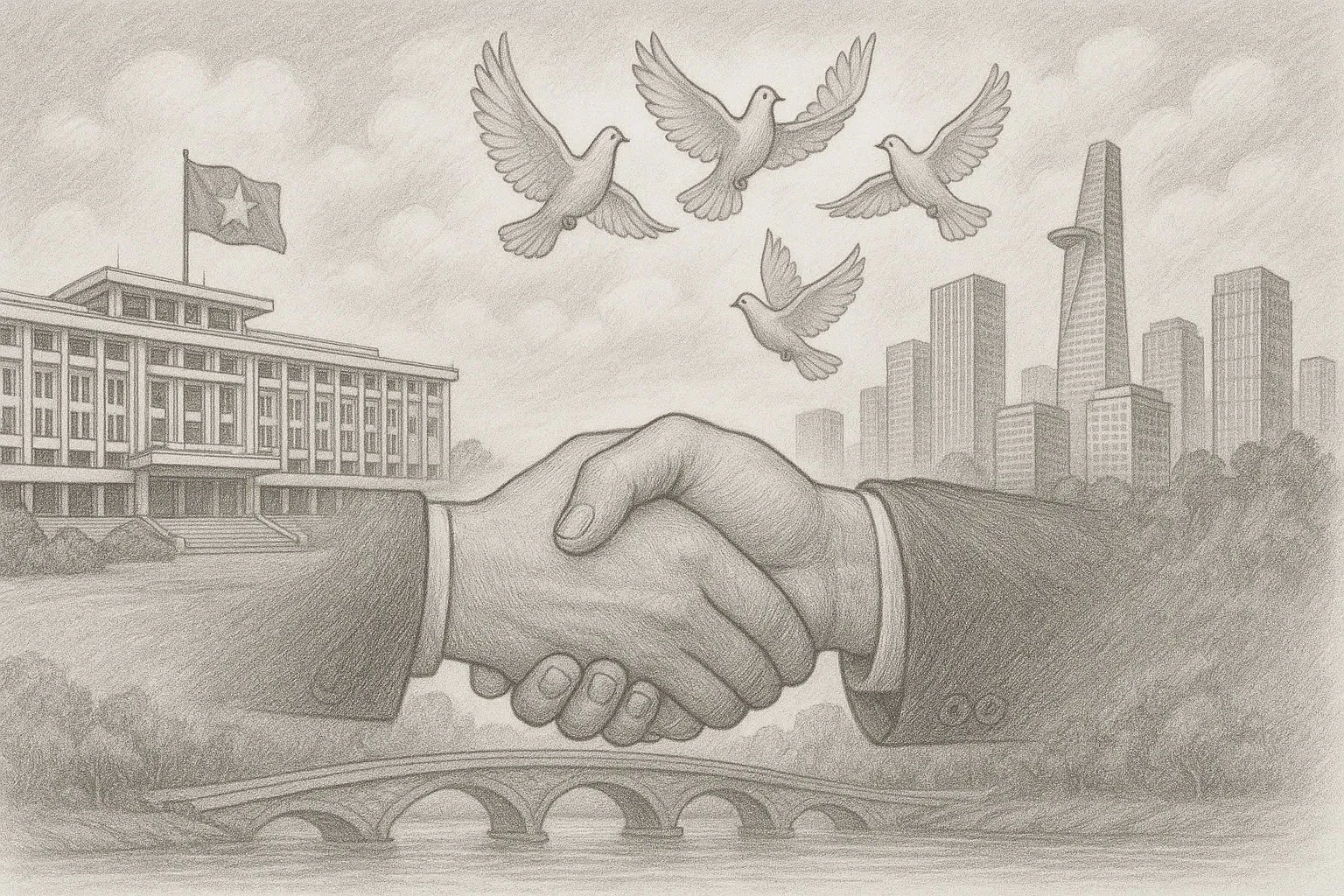Vietnam dreams of national reconciliation as one homeland for one future
The whole nation of Vietnam is heading towards the 50th anniversary of the Reunification Day, which falls on April 30. In today's Words on the Street edition, let's take a loom into Vietnam's journey to achieve full national reconcilation.
THE HANOI TIMES — In these last days of April, 100 million hearts across Vietnam beat as one, with their sights set on Ho Chi Minh City, where the nation will soon celebrate the 50th anniversary of National Reunification Day.

Fifty years ago, at noon on April 30, 1975, the flag of the National Liberation Front flew over the Palace of Independence in Ho Chi Minh City, marking the end of a divided Vietnam. North, Central, and South were reunited, and the internal barriers between the regions were torn down.
Half a century later, Vietnam has risen steadily to become a trusted partner in the international community. It is now a middle-income country, an emerging Asian tiger, and an attractive destination for tourists and investors worldwide.
But behind these achievements lies a lingering sadness for the entire nation: the challenge of true national reconciliation, a task still unfinished.
The war not only divided the nation, but also displaced many Vietnamese from their homeland in search of a new life. Even today, divisive rhetoric on social media and in certain media outlets by a small group that harbors resentment toward the current political system continues to fuel tensions.
Refusing to acknowledge the progress made over the past five decades, this minority often emphasizes only Vietnam's shortcomings.
It is undeniable that no political system is perfect. However, with a spirit of openness, Vietnam remains committed to national solidarity and consistently maintains that the Vietnamese community abroad is an inseparable part of the nation.
Beyond the negativity of a few, the majority of overseas Vietnamese play a positive role in Vietnam's globalization efforts. Remittances to Vietnam in Q1/2025 exceeded US$2.4 billion, up nearly 20% from the previous quarter. This amount represents a quarter of last year's total remittances.
Overseas Vietnamese are helping to strengthen diplomatic ties, cultural exchanges, and economic partnerships between Vietnam and the world. Many have achieved success abroad, generating pride in their homeland without showing hostility to their roots.
In addition, many individuals who once opposed Vietnam's political system have since returned to contribute to national development and leave a significant mark on the country's progress.
Last year, there was a dialogue between Vietnamese-American legislators from Washington State and Vietnamese students, among them Joseph Nguyen and My Linh Thai.
Born and raised the US, their perspectives differ from those of the older generation. Representing the second generation of Vietnamese Americans, Joseph Nguyen and My Linh Thai have worked to support the Comprehensive Strategic Partnership between Vietnam and the US.
Speaking proudly of the 90,000-strong Vietnamese and Vietnamese-American community in Washington, My Linh Thai said, "Their greatest contribution to American society is the thousand-year-old cultural heritage of Vietnam, which is deeply rooted in everyone's heart."
"This bond motivates us to preserve it and pass it on to our children so they can find themselves and understand their roots," she added.
Joseph Nguyen shared, "Our visit to Vietnam is to discuss how we can become better partners. We hope this is an opportunity to learn, grow and build a better future together."
People like Joseph Nguyen and My Linh Thai embody the positive spirit of the overseas Vietnamese communities.
I believe that connecting Vietnamese people at home and abroad is a sacred mission. Vietnam is always ready to welcome kindred spirits who share the dream of a united, free and prosperous nation.
President Ho Chi Minh once said of reconciliation, "Anyone who sincerely supports peace, unity, independence and democracy, even if he once opposed us, we should sincerely unite with that person."
"Solidarity is a national policy, not a political tactic," he said.
Over the past 50 years, this principle has been reflected in every major decision and action. The Ninth National Congress of the Communist Party of Vietnam reaffirmed the spirit of great national unity: "Every member of the Vietnamese family, whether at home or abroad, is part of the flesh and blood of the nation."
Healing the wounds of the past and working together for the future is essential. For younger generations, continuing the traditions of forgiveness and compassion among the Vietnamese community may come more naturally.
At the same time, young people must firmly reject extreme ideologies and divisive actions that harm national unity.
The achievements Vietnam has made-independence, stability, and global recognition-are a living testimony to the right path chosen by the Party and the people.
It is hoped that the spirit of reconciliation will continue to grow until every Vietnamese - at home and abroad - stands united and strives for the common goal of national harmony, development and progress.
As General Secretary To Lam recently wrote in his article entitled "One Vietnam, One Nation": "Reconciliation does not mean forgetting history or erasing differences. It means accepting different perspectives with tolerance and respect to pursue the greater goal of building a peaceful, united, strong, civilized, and prosperous Vietnam so that future generations will never again have to endure the tragedies of war, division, and loss."
"We believe that every Vietnamese - no matter where they live or what their past may be - can walk together, contribute and help build a better future for the nation. The Party and the State will always open their arms, value all contributions, and listen to all voices of solidarity from the overseas Vietnamese community - those who help connect Vietnam to the world."












